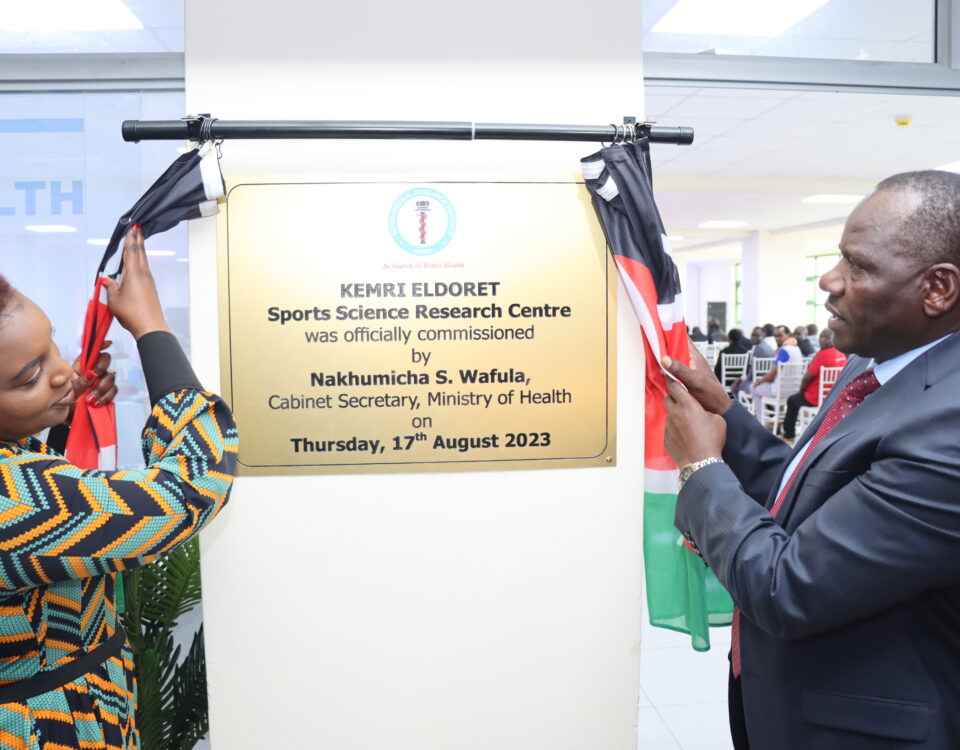
The GDAR Study Hosts Key Workshop to Enhance Urban Resilience
July 2, 2024
KEMRI Scores 80% in the 2024 CustomerSatisfaction Survey.
July 17, 2024KEMRI in a Historic Global Consortium for Phase III Trials forAnti-malarial in Pregnacy Study.
The Safety of Antimalarials in the First Trimester (SAFIRE) consortium, comprised of leading scientific and social research experts in malaria during pregnancy, has embarked on a groundbreaking Phase III clinical trials that aim at testing the efficacy and safety of antimalarials for women in their first trimester of pregnancy.
SAFIRE aims to generate robust evidence on the efficacy, safety, and tolerability of antimalarials in early pregnancy through an adaptive platform trial and social research.
The key objectives of the trial include generation of evidence through the provision of data on the efficacy, safety, and tolerability of antimalarials in the first trimester; use the trial results to shape policies and guidelines, ensuring optimal treatment options for pregnant women and addressing the lack of treatment options for women in the first trimester of pregnancy.
Enrolment of participants is set to begin next year, pending data from the MiMBa Pregnancy Registry and PYRAPREG studies. The trial will initially evaluate two treatment arms: Pyronaridine-Artesunate (PA) with ArtemetherLumefantrine (AL) serving as the comparator. PA is an ACT recommended by WHO for malaria treatment in the general population, with preclinical and clinical data suggesting it is safe for use in pregnancy.
Dr. Hellen Barsosio, a co-lead of the project and Research Scientist of maternal and newborn health at the Kisumubased Center for Global Health Research (CGHR), emphasized the importance of this trial. “We are thrilled to begin this first-of-its-kind trial. Pregnant women are typically excluded from clinical trials for fear of causing harm. Determining which antimalarial medicines are efficacious and well tolerated in the first trimester will benefit all women of childbearing age, including those unaware they are pregnant, by enabling them to take these medicines without risk,” said Dr. Barsosio.
Malaria in pregnancy poses severe health risks, including miscarriage, stillbirth, preterm delivery, low birthweight, severe maternal anemia, severe malaria, and maternal mortality. Currently, artemether-lumefantrine (AL) is the only ACT recommended for treating uncomplicated malaria in the first trimester. However, emerging drug resistance in several African countries necessitates diversifying ACTs, which may inadvertently expose pregnant women to drugs other than AL.
The SAFIRE consortium, coordinated by Amsterdam University Medical Center, with scientific co-leadership from the University of Sciences, Techniques and Technologies of Bamako (USTTB) and KEMRI, seeks to fill this critical evidence gap. Co-sponsored by Medicines for Malaria Venture (MMV) and the Liverpool School of Tropical Medicine (LSTM), the trial is the first Bayesian adaptive platform trial to assess antimalarial treatments’ efficacy, safety, and tolerability in early pregnancy.
The trial will also involve significant social and implementation research to ensure ethical and successful enrolment of participants. Maud Majeres Lugand, Associate Director of Social Research at MMV, stated, “Engaging with the community to build trust and understand recruitment barriers like cultural sensitivities and concerns about taking medicines in early pregnancy is crucial for ethical and successful enrolment.”
Malaria not only poses health risks but also incurs substantial economic and social costs. Effective prevention and treatment during pregnancy can alleviate these burdens, enhancing public investments in malaria control. However, global efforts to eliminate malaria by 2030, as outlined in the UN Sustainable Development Goals and WHO’s Global Technical Strategy for Malaria, are lagging.
Prof. Kassoum Kayentao of USTTB highlighted the urgency, “It took 20 years for WHO to recommend AL for malaria treatment in the first trimester. We urgently need alternative therapeutic options in this sensitive phase of pregnancy.”
Dr. Michael Makanga, Executive Director of Global Health EDCTP3, stressed the importance of this project. “Malaria during pregnancy can cause serious maternal and newborn health issues. That is why we are supporting this crucial project, SAFIRE, with over €5 million. We hope it will provide sound evidence for developing safe and efficient treatment options for pregnant women.”
With over 12.7 million pregnancies exposed to malariain Africa in 2022 alone, the need for effective treatment options in the first trimester is critical. SAFIRE’s Phase 3 trial represents a significant step towards achieving malaria elimination and improving health outcomes for pregnant women globally.

